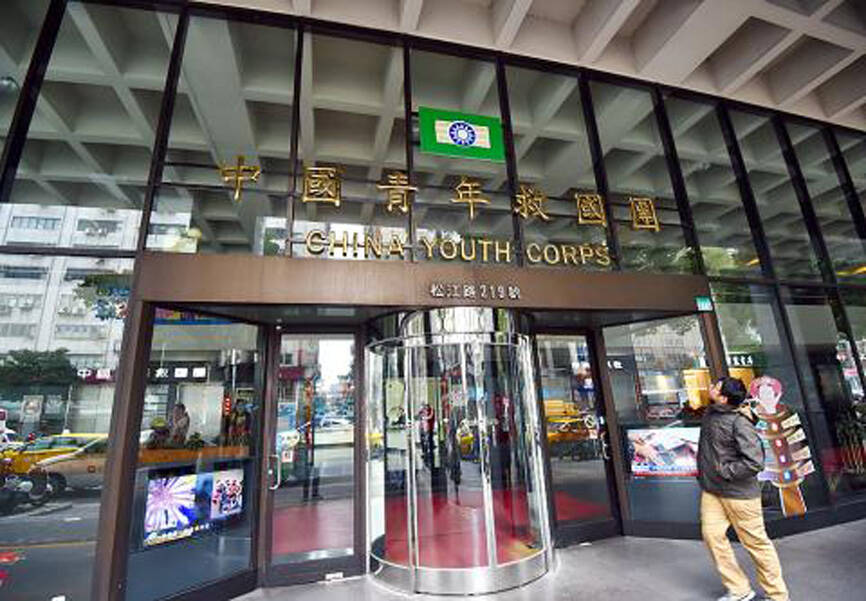The Taipei High Administrative Court on Thursday denied a petition filed by the China Youth Corps contesting the Executive Yuan’s recognition of the group as an affiliate of the Chinese Nationalist Party (KMT).
The Executive Yuan’s Ill-gotten Assets Settlement Committee in 2018 froze N$5.6 billion (US$170.64 million) in assets under the organization.
The ruling can still be appealed.

Photo: Chien Jung-fong, Taipei Times
Committee officials said the ruling set a legal precedent for future cases, such as restoring state assets and funds owned by the National Women’s League and the Chinese Association for Relief and Ensuing Service, as the corps denied that it was a KMT affiliate organization.
The Taipei High Administrative Court said that multiple KMT Central Reform Committee resolutions between 1951 and 1952, and a nationwide statement on March 29, 1952, announcing the establishment of the corps, with then-director-general of the Ministry of National Defense’s Political Warfare Bureau Chiang Ching-kuo (蔣經國) tapped to oversee the preparations for the corps establishment, demonstrated ties with the KMT.
The resolution passed by the KMT Central Reform Committee said that the organization, then known as the China Youth Anti-Communist National Salvation Corps, was a government organization and would be led by the KMT, the administrative court said.
The court added that beginning with the first appointments of the corps’ Affairs Consultant Committee members in 1978, all committees included the head of the Executive Yuan’s Youth Development Administration or the party’s Youth Affairs Committee head.
The court cited statements made by Lee Chung-kuei (李鍾桂), corps president from 1987 to 2005, who said he was appointed by Chiang, then-KMT chairman, as proof that the KMT had control over the corps.
The court said that in the latter stages of the corps’ history, the then-KMT government included funding for the organization in its budget.
The court said facilities hosting corps recreational events were obtained at lower than the market price or without compensation, while its headquarters had been built using government funds.
Even if the argument that the corps had severed ties with the KMT in 1999 were credible, its finances and property ownership had not been sorted out, the court said.

The High Prosecutors’ Office yesterday withdrew an appeal against the acquittal of a former bank manager 22 years after his death, marking Taiwan’s first instance of prosecutors rendering posthumous justice to a wrongfully convicted defendant. Chu Ching-en (諸慶恩) — formerly a manager at the Taipei branch of BNP Paribas — was in 1999 accused by Weng Mao-chung (翁茂鍾), then-president of Chia Her Industrial Co, of forging a request for a fixed deposit of US$10 million by I-Hwa Industrial Co, a subsidiary of Chia Her, which was used as collateral. Chu was ruled not guilty in the first trial, but was found guilty

DEADLOCK: As the commission is unable to forum a quorum to review license renewal applications, the channel operators are not at fault and can air past their license date The National Communications Commission (NCC) yesterday said that the Public Television Service (PTS) and 36 other television and radio broadcasters could continue airing, despite the commission’s inability to meet a quorum to review their license renewal applications. The licenses of PTS and the other channels are set to expire between this month and June. The National Communications Commission Organization Act (國家通訊傳播委員會組織法) stipulates that the commission must meet the mandated quorum of four to hold a valid meeting. The seven-member commission currently has only three commissioners. “We have informed the channel operators of the progress we have made in reviewing their license renewal applications, and

Taiwan People’s Party (TPP) Chairman Huang Kuo-chang (黃國昌) yesterday appealed to the authorities to release former Taipei mayor Ko Wen-je (柯文哲) from pretrial detention amid conflicting reports about his health. The TPP at a news conference on Thursday said that Ko should be released to a hospital for treatment, adding that he has blood in his urine and had spells of pain and nausea followed by vomiting over the past three months. Hsieh Yen-yau (謝炎堯), a retired professor of internal medicine and Ko’s former teacher, said that Ko’s symptoms aligned with gallstones, kidney inflammation and potentially dangerous heart conditions. Ko, charged with

Taiwan-based publisher Li Yanhe (李延賀) has been sentenced to three years in prison, fined 50,000 yuan (US$6,890) in personal assets and deprived political rights for one year for “inciting secession” in China, China's Taiwan Affairs Office spokesman Chen Binhua (陳斌華) said today. The Shanghai First Intermediate People’s Court announced the verdict on Feb. 17, Chen said. The trial was conducted lawfully, and in an open and fair manner, he said, adding that the verdict has since come into legal effect. The defendant reportedly admitted guilt and would appeal within the statutory appeal period, he said, adding that the defendant and his family have